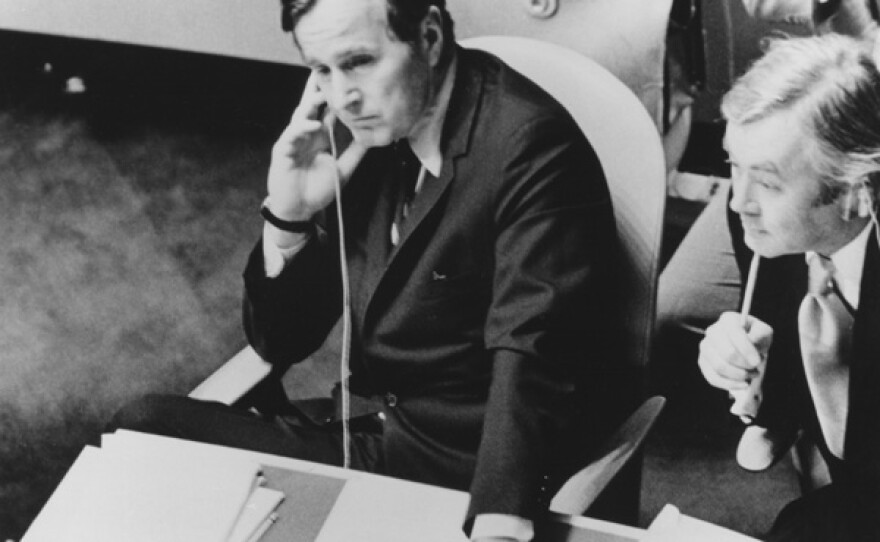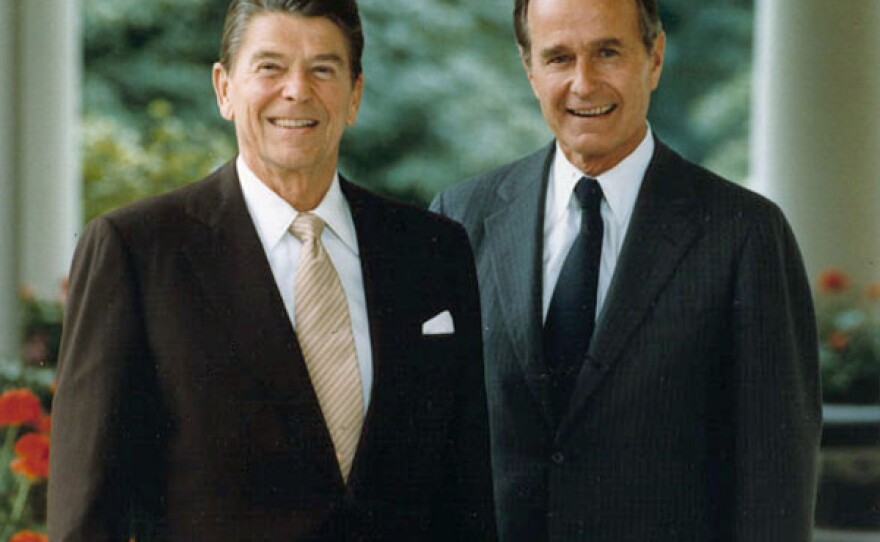—Learn more about the life and presidency of George H.W. Bush—
When George. H. W. Bush left the Oval office in 1993, rejected after one tumultuous presidential term, his 30-year career in public service came to an abrupt and unexpected end.
Despite soaring approval ratings following military victory in the Persian Gulf, his years as president after the war were marked by almost unrelieved decline.
A sluggish economy and an earlier decision to raise taxes — despite an explicit campaign oath not to do so — led to his defeat. By the end of his term many observers dismissed him as an artifact of an irrelevant Cold War past.
“George H. W. Bush,” is part of the Peabody Award-winning AMERICAN EXPERIENCE collection The Presidents.
With unparalleled access to figures in Bush’s private and public life, the film reveals Bush as a pivotal player during a critical moment in American and world history and in a powerful political dynasty.
Bush’s personal letters and interviews with his closest advisors and prominent critics inform the film, which features interviews with First Lady Barbara Bush, Condoleezza Rice, Colin Powell, Mikhail Gorbachev and more.
“George H. W. Bush” tells the story of a man born to both economic and political privilege and tutored in modesty, who enlisted in the Navy on his 18th birthday and became a hero in World War II.
It recounts Bush’s post-war time at Yale University, where he excelled in athletics, and his marriage to Barbara Pierce.
It tells of his adventurous days as a Texas oil wildcatter, the tragic loss of a daughter to leukemia, and his entry into Republican politics at a time of roiling change.
In 1962, Bush was asked to run for chairman of Houston’s Harris County Republican Party in an effort to keep the rabidly anti-Communist John Birch Society from gaining control.
Following his victory, to the dismay of traditional Republicans, Bush gave the Birchers jobs as his interest was in expanding a party that hardly existed in Texas.
The next year he saw another opportunity to expand the party when President John F. Kennedy proposed civil rights legislation, leading segregationists to abandon the Democratic Party in favor of the Republicans. Bush welcomed them.

Bush’s upward path through the changing landscape of Texas and national politics took him to the U.S. House of Representatives, the United Nations, the Republican National Committee, the Central Intelligence Agency, and to China as an ambassador, giving him one of the most distinguished résumés in government — and a front row seat for the intrigue of Watergate and the management of the Cold War.

Passed over for the vice-presidency by Gerald Ford, Bush would go on to serve Ronald Reagan in that role for two terms during the heyday of the conservative ascendancy before eventually assuming the presidency in 1988.
During the next four years, George H. W. Bush’s term in the nation’s top office would take him from the highest approval rating ever recorded at the time to the most dramatic rejection of a sitting president in more than 80 years.
In his 1988 campaign, Bush made a promise to the American people: “Read my lips — no new taxes.” With a recession looming, Bush soon came to believe he would have to renege on his pledge for the good of the nation.
Inheriting a savings and loan crisis and a growing deficit from his predecessor, he was severely criticized when he agreed to raise taxes. “This could mean a one-term presidency,” Bush confided in his diary, “but it’s that important for the country.”
With both houses of Congress against him, Bush faced limited opportunities to affect domestic affairs but did take pride in two key pieces of legislation: the Americans with Disabilities Act and the Clean Air Act. However, his most memorable accomplishments were in foreign policy, where he oversaw a period of significant world change.
President Reagan may have initiated the end of the Cold War but it was Bush who brought it to a close without a shot being fired.
“Reagan did all of the exciting, glitzy stuff,” says former Secretary of State Colin Powell in the film.
But it was Bush who shepherded the reunification of East and West Germany and the integration of Germany into NATO.
Despite his Cold War accomplishments, it was victory in the first Gulf War that would send George Bush’s approval rating to 89 percent, at the time, the highest ever recorded.
In 1991, Bush drew upon the relationships he had built in his many years at the United Nations, in China, at the CIA, and as vice president to assemble a coalition of 30 nations to oppose Saddam Hussein’s invasion of Kuwait.
After a ferocious air campaign, coalition troops would spend just 100 hours fighting on the ground, chasing the Iraqi army out of Kuwait in just four days. But Bush would not send troops into Baghdad to topple Hussein’s regime.
Bush had amassed all the political capital a president could have, but as the economy continued to sink and the unemployment rate soared, he was accused of losing touch with the American people and with his party.
To his detriment, he underestimated the growth of the Conservative Right, the same group that he had courted as Reagan’s heir.
They would not re-elect the moderate Republican that Bush, like his father Prescott, had become. Bush ran a weak re-election campaign in 1992, paving the way for Arkansas Governor Bill Clinton to become the next President.

THE PRESIDENTS COLLECTION ON DEMAND:
AMERICAN EXPERIENCE launched The Presidents, a digital portal showcasing more than 750 assets from the Peabody Award-winning collection of films about our nation’s most important leaders. The portal allows viewers to screen full-length films, delve deeper with experts and living witnesses, and examine more than 200 primary source documents. Video galleries on The Presidents site explore how different presidents faced issues including the economy, war, dealing with a crisis, and abuses of power.
You can download The Presidents Collection on iTunes, or buy The Presidents DVD pack at ShopPBS.org.
CONNECT:
AMERICAN EXPERIENCE is on Facebook, Instagram, Tumblr, and you can follow @AmExperiencePBS on Twitter.
CREDITS:
Written and directed by Austin Hoyt and produced by Hoyt and Callie Taintor Wiser. Editors: Bernice Schneider (Part 1) and Jon Neuburger (Part 2). Director of Photography: Stephen McCarthy. Composer: Michael Bacon. Narrator: David Ogden Stiers. AMERICAN EXPERIENCE is a production of WGBH Boston. Senior Producer: Susan Bellows. Managing Director: James E. Dunford. Executive Producer: Mark Samels.





